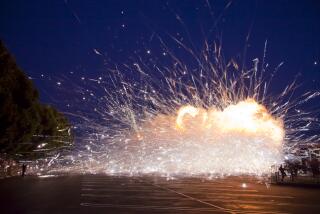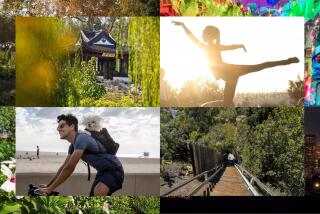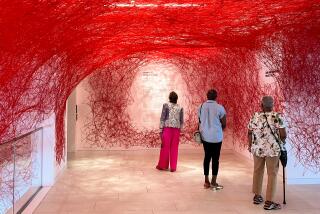In a heated political moment, the ambitious Latino art series Pacific Standard Time: LA/LA opens
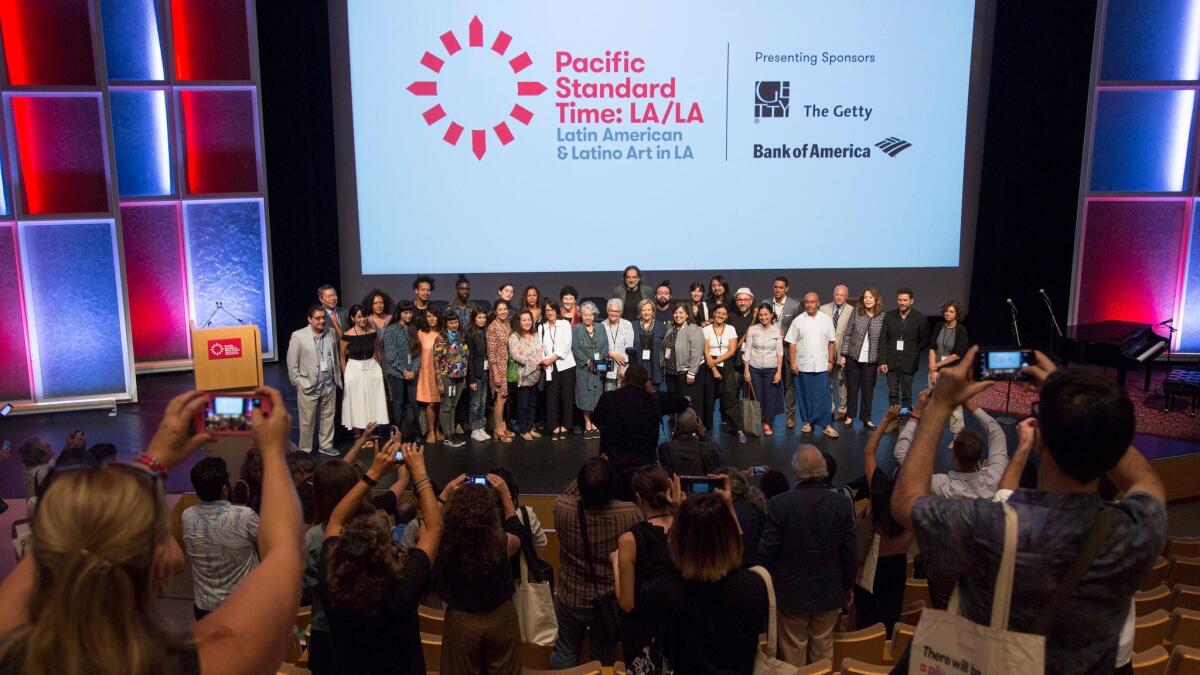
- Share via
After years of planning, Pacific Standard Time: LA/LA, the Getty Foundation’s ambitious multi-venue initiative focused on Latin American and Latino art, officially launches this week across Southern California.
At the Getty Center on Tuesday, dozens of artists and curators from all over the Americas gathered for an opening press conference. Featuring a brief panel discussion, an excerpt of a theatrical artwork and a musical performance, the event was intended to provide a taste of the breadth of the series, which includes some 80 exhibitions at more than 70 Southern California institutions, as well as hundreds of performances and public programs.
Although the mood was celebratory, many participants noted the timely relevance of the initiative given the current divisive political moment, including the looming border wall expansion and President Trump’s recent announcement to end the Deferred Action for Childhood Arrivals (DACA) program.
“Works of art don’t acknowledge political borders,” noted James Cuno, president and CEO of the J. Paul Getty Trust in his introductory remarks.
Artist Judithe Hernandez, the only female member of pioneering Chicano artist collective Los Four, echoed Cuno’s sentiments.
“It is an indictment of all of the false narratives that have been coming out of the White House, about the contributions of Mexican Americans in particular,” she told The Times shortly after the event. “It could not have come at a better time.”
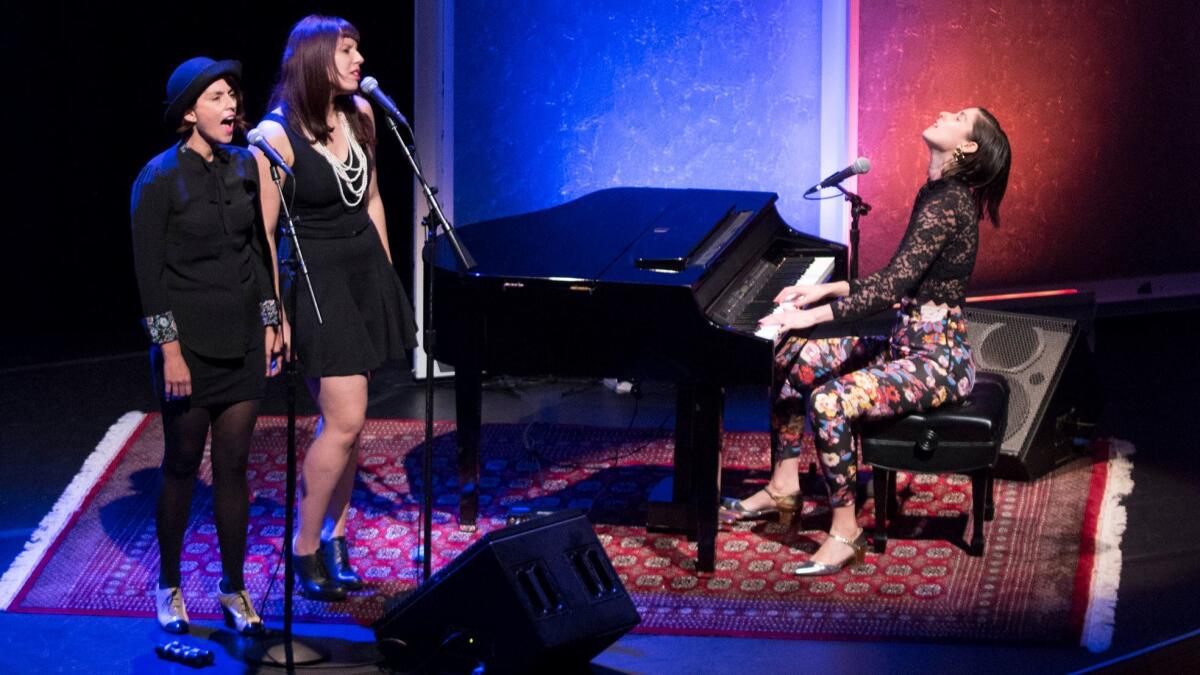
Joining Cuno to introduce the event were Garret Gin, senior vice president of Bank of America, PST: LA/LA’s presenting sponsor; Deborah Marrow, director of the Getty Foundation, and Patricia Phelps de Cisneros, a prominent collector and champion of Latin American art. Mayor Eric Garcetti was on a trip to Peru related to Los Angeles’ Olympics bid, but welcomed the audience in English and Spanish via a brief video message.
These remarks were followed by the staging of a small portion of Palabras Ajenas (The Words of Others), a 1967 work by Argentine artist León Ferrari, who will have a solo exhibition at REDCAT this fall. Several performers read bits of quotations from various historical figures including President Lyndon B. Johnson, Pope Paul VI and even Adolf Hitler, alongside snippets of media coverage, creating a sort of verbal collage. Many of the passages referencing outsiders, nationalism and foreign wars seemed disturbingly contemporary.
Afterward, KCET chief creative officer Juan Devis led a discussion with participating PST: LA/LA artists Carmen Argote, Abraham Cruzvillegas and Liliana Porter, who in a sense represent the diversity present in PST, spanning three generations, with roots in the U.S., Mexico and Argentina. More than simply showcasing Latin American and Latino art, these artists spoke about the potential of the program to expand notions of identity.
“I’m hoping that this initiative complicates the conversation, so it isn’t so much a dichotomy of this or that, but you see how things layer on top of one another,” said Argote, who was born outside of Guadalajara, but moved to Los Angeles’ Pico-Union neighborhood when she was 5. She is included in the exhibition “Home: So Different, So Appealing” at LACMA, where she has installed a large section of the carpeting from her childhood home, painted and hung on the wall. Cascading onto the floor, it is part art object and part home furnishing.
In addition to his “Home” contribution — a sprawling construction of found materials inspired by informal types of housing — Abraham Cruzvillegas has curated an exhibition that bears an exceedingly lengthy title, with fellow Mexican artist Gabriel Kuri at Hollywood’s Regen Projects.
“For us, it was very important to expand our gaze, our vision,” he said. “We expanded it to the Pacific Rim… expanding our perception of what we think we are.” Using a 1939 map designed by Mexican artist Miguel Covarrubias as a backdrop — a map that omits Europe and focuses on the Pacific — the exhibition includes Latin American artists from around the globe, including South Korea, New Zealand and Japan. “More than transnational, I think it’s intergalactic,” he said.
Works of art don’t acknowledge political borders.
— James Cuno, president and CEO of the J. Paul Getty Trust
Argentine-born Liliana Porter, whose work is featured in no fewer than three PST: LA/LA shows, embodies this sense of complicated identity. Her grandparents were from Russia and Romania, and though she was born in Buenos Aires, she moved to New York in 1964 (“I arrived with the Beatles,” she joked to The Times afterward), where she has lived ever since.
“We are really a mixture of cultures and experiences,” she said. “It would be wonderful to be able to be all that at the same time, without having to have a category that negates the rest that we are.”
Her work ranges from drawings that incorporate Disney characters in “How to Read El Pato Pascual” at the MAK Center and the Luckman Fine Arts Complex, which looks at the influence of Disney on Latin America and vice versa, to photo-based works in “Photography in Argentina: 1850-1910” at the Getty and “Radical Women” at the Hammer.
A concluding upbeat musical performance by Chilean-born pianist and singer Francisca Valenzuela provided a glimpse at another aspect of PST: LA/LA, a program of musical events that include a concert at the Hollywood Bowl (including Café Tacvba, Mon Laferte and La Santa Cecilia) and a contemporary music series at Walt Disney Concert Hall.
More than simply a series of exhibitions, PST: LA/LA is poised to expand the way we look at the arts produced by some of our closest geographic and cultural neighbors, and the way we think about our relationship to them as well.
I’m hoping that this initiative complicates the conversation, so it isn’t so much a dichotomy of this or that.
— Carmen Argote, PST: LA/LA artist
“When people know each other more, there is more possibility of dialogue,” Porter told The Times. “This series of shows, the most important thing is that it promotes awareness.”
Recalling a conversation he had with Phelps de Cisneros, Cuno remarked, “I told her how this was a historic moment, and she said, ‘No, this is a moment in which history has changed.’”
Sign up for our weekly Essential Arts & Culture newsletter »
On Twitter: @Laurie_Ochoa
ALSO
How Mexico’s súper rudas ‘Radical Women’ are rewriting the history of Latin American art
Review: Pacific Standard Time exhibition at the Fowler traces the power of sacred plants in Brazil
More to Read
The biggest entertainment stories
Get our big stories about Hollywood, film, television, music, arts, culture and more right in your inbox as soon as they publish.
You may occasionally receive promotional content from the Los Angeles Times.
